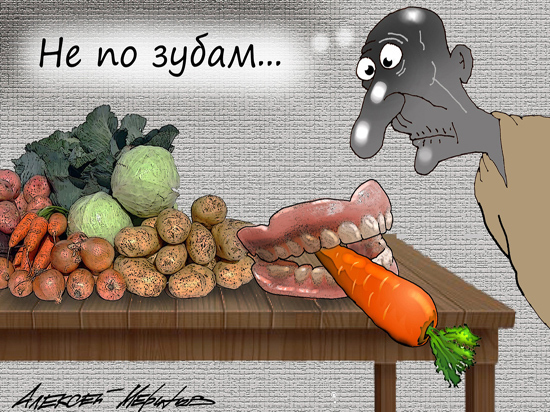Domestic potatoes may not reach the buyer
For vegetables for the borscht set, this wintering, one might say, was a success. Both in the snow and in a snowstorm, potatoes did not rise above 23 rubles per kilogram, carrots cost 25, and cabbage did from 16 to 19 rubles. And what were the prices for the same products a year ago — I don’t even want to remember! But the music didn't play for long… Participants of the agrarian market warn: domestic vegetable stores are getting empty, and it's time to wait for another rise in prices for borscht.

Okay, experts — ordinary buyers are sounding the alarm.
— The rise in price has already begun, — one lady in the supermarket tells me. — You see, potatoes cost 32 rubles, but they are good. Yesterday I bought in another store for 25 and threw it all away. You start cleaning, and it's black inside …
True, according to Rosstat, there is no tendency to increase prices for a vegetable set, quite the contrary. In the period from March 14 to March 20, according to the statistical agency, vegetable prices fell by an average of 0.4%. Including 0.3% for potatoes, 0.5% for white cabbage, 0.1% for table beet…
But this is on paper, in life everything is not so. At vegetable stalls near retail outlets and in tents, almost all vegetables cost at least 50 rubles a kilo. Private merchants sensed spring earlier than retail chains. Potatoes, which are sold for 60 rubles, and onions, which cost as much as 90 rubles, are knocked out of this price range!
Since the beginning of the year, prices for this product have increased by 74%, in some regions its cost is even higher than the anomalous records of a year ago, when food inflation simply went through the roof. We do not have enough of our own onions, and the republics of Central Asia have imposed restrictions on its supplies to Russia.
…I am walking along the long counters of a large trading network. In the nearest district, it is the only one where discounted prices for potatoes are low — 32 rubles. But it is really good — large and clean. In the rest, it’s just rotten, and it’s clear that from day to day we will switch to Egyptian or Azerbaijani “second bread”.
Cabbage — 19 rubles, onions — 60, carrots — 40 rubles. 40 rubles and table beets, but there are very few of them, some leftovers.
The eyes are striking … no, not prices, which are systematically growing by the usual 5-10%, but the absence of leeks. Many housewives even gloat about it. In Europe, such a product is a real hit, everyone is crazy about it. But in our country, for some reason, it causes protest among buyers. Probably because we are not Europeans. But also because this bow costs … 400 rubles a kilogram!
— I'd better buy two kilograms of pork for that kind of money, — one woman says. — What is special about it?
— But the leek, nevertheless, is not on the shelves, which means that it must have been sold out, — I object.
— For such and such a price ? They stopped bringing it to the store, no one takes it. It’s better to buy a kilogram of fish for that kind of money once a month…
In general, against the background of leeks, which “stopped being imported” due to the insolvency of the population, all other vegetables seem to be simply free. True, its closest relative, onions (as customers say, they are very similar in taste), once again rose in price by 0.6% over the week.
In a word, spring crept up unnoticed. The authorities, as always, say that the increase in the price of a vegetable set is a seasonal and expected phenomenon. And who is warned, he, respectively, is armed. The Russians will not experience any stress from the “seasonal” rise in prices. Indeed, for borsch, the same carrot or cabbage requires very little.
According to experts, potatoes are at risk: it is more difficult with it, we consume a lot of it, and here we have to spend money. The question is, for what reason? This year, there are still unsold deposits of domestic «second bread» in large and small farms. Which, for unknown reasons, does not reach the trading shelves. In theory, until May itself, it could even become cheaper in retail trade, domestic producers are ready for supplies. For example, Bryansk peasants offer shops 10-12 rubles per kilogram — however, excluding delivery. Okay, let's add two more rubles for transportation — so why are there no domestic tubers? In April, they will lose any presentation and then they will definitely become useless to anyone.
It is believed that retail chains save volumes for the purchase of imported potatoes, which suit them according to «beauty standards» — size and appearance. But will they then cost in supermarkets, as today at a private trader, 50-60 rubles each? The question is rhetorical. In general, spring has come — open your wallets…

